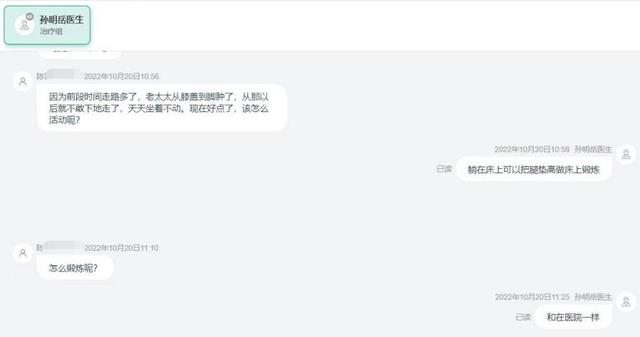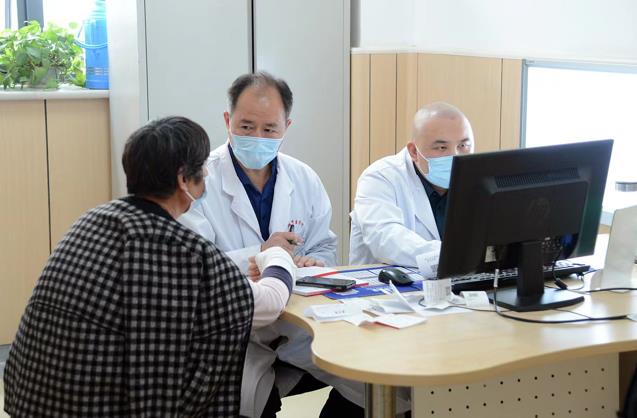Public Network Poster Journalist Yue Xiaoyuan reports from Jinan
With the accelerated development of smart medical care, digital intelligence technology continues to penetrate the diagnosis and treatment links, and the efficiency before and during diagnosis is constantly optimized. Patients can already enjoy convenient services from registration and other links; However, in terms of post-diagnosis management, due to the lack of scientific self-health management means and professional medication guidance, many patients who need to take drugs for a long time, adjust drugs and need regular follow-up visits will stop taking drugs on their own, resulting in poor treatment effect, and it is urgent to explore and innovate smart services.
In order to solve the problems of patients’ declining self-management ability and medication compliance after leaving the hospital, Zaozhuang Municipal Hospital is guided by problems and needs, supported by new concepts and technologies such as AI and digitalization, actively seeking better solutions, exploring the intelligent management mode of "discharged patients -AI- doctors" and opening up the "last mile" of closed-loop medical services. Nowadays, under the background of "Digital Intelligence Empowering Medical Care", Zaozhuang Municipal Hospital has achieved initial results in patient management services in such scenes as personalized health guidance, online consultation, intelligent follow-up, out-of-hospital signs monitoring and analysis, and follow-up reminders, relying on a convenient and efficient post-diagnosis management system.
"When I was at home, my blood sugar control was very bad. Going to the hospital was also very troublesome and very anxious." Aunt Fang’s experience is typical: at the age of 86, she suffered from diabetes for many years, and was admitted to hospital for treatment because her blood sugar was "out of control". However, how to monitor her blood sugar at home in time after discharge and facilitate contact with doctors is a major problem that plagues her family. I learned that the post-diagnosis management platform can bind the blood glucose meter, realize the automatic uploading of physical sign data and timely warning of abnormal conditions, and Fang Ayi’s daughter took the initiative to join. After a period of drug treatment at home, the platform monitored that Aunt Fang’s blood sugar data fluctuated violently, and AI automatically called her family to understand the situation. It was discovered that the family members of the existing aunt changed metformin tablets (three times a day) into metformin sustained-release tablets (once a day). AI judged the risk of drug change and immediately fed back the early warning signal to the health manager and doctor for manual intervention to remind the family members not to adjust the drugs themselves. This incident made Aunt Fang’s daughter particularly grateful and called "the post-diagnosis management platform gave patients and their families a reassurance". Nowadays, relying on the intelligent post-diagnosis management platform, Aunt Fang can regularly measure her blood sugar at home, and her family members can contact health managers and doctors at any time on the platform for consultation on medication adjustment, diet structure and other issues. Now Aunt Fang’s blood sugar value has basically stabilized.
Not only diabetes, but also the post-diagnosis management of orthopedic patients is "difficult". Can artificial intelligence technology also be used to establish an efficient connection between doctors and patients to help patients recover scientifically? Come and see the medical experience of 81-year-old Aunt Chen.
Aunt Chen suffered from intertrochanteric fracture due to a fall at home, and was discharged smoothly after treatment. Because Aunt Chen is old, her family members are very worried about the condition of the elderly, but they don’t know much about how to carry out targeted exercise. After learning about the post-diagnosis management service of trauma orthopedics, you can consult dressing change, reexamination, stitches removal and other issues online, or you can contact doctors conveniently and quickly, and your family members will join immediately. The AI intelligent doctor assistant on the platform will send rehabilitation guidance, and the family members will assist Aunt Chen in rehabilitation exercise at home according to the rehabilitation exercise video sent on the platform; The platform provides registration guidance for patients and sends a review reminder. Aunt Chen only needs to "step on the point to go to the hospital for review" according to the platform message, which makes Aunt Chen’s daughter call "too convenient, very calm!"

Aunt Chen’s children are bound to the platform to ask about rehabilitation precautions.
This patient’s comfortable medical experience is the epitome of the results of Zaozhuang Municipal Hospital’s careful layout of post-diagnosis management services, and it is also a vivid embodiment of the continuous amplification of high-quality medical resources by digital new technologies. In order to actively respond to the national new medical reform policy, change the medical service mode, improve the medical service level, and quickly and efficiently solve the hot, difficult and blocking problems of the masses in seeking medical treatment, Zaozhuang Municipal Hospital, in combination with the launch of the "Action to Improve the Satisfaction of the Masses in Seeing a Doctor", piloted the working mode of "Artificial Intelligence+Post-diagnosis Management" to carry out full-cycle refined health management services for patients.
On the one hand, we will build an artificial intelligence laboratory with Xunfei Medical, and make full use of artificial intelligence technology to explore patient intelligence services in scenarios such as personalized rehabilitation, personalized health guidance, all-weather response, smart phone follow-up, and remote sign monitoring; On the one hand, the construction of AI patient service center, equipped with professional health managers, realizes the full-cycle management of patients from leaving hospital to home rehabilitation, and improves the overall effect of treatment; On the other hand, the relevant functional departments innovatively incorporate the post-diagnosis management of AI into the follow-up system and organize its implementation, which is known and strictly implemented by relevant personnel in the departments that have been carried out. At present, 12 departments, including trauma orthopedics, spine, obstetrics, endocrinology and metabolism, have officially put into operation full-cycle refined health management services, which not only enhanced patients’ compliance, effectively extended the treatment plan, but also greatly improved the satisfaction of the people in seeing a doctor.

Doctors in Zaozhuang Municipal Hospital are making detailed inquiries.
Based on the innovative exploration of patient management after diagnosis, in the recent 2022 China Modern Hospital Management Typical Case Selection organized by the Capacity Building and Continuing Education Center of the National Health and Wellness Commission, Zaozhuang Municipal Hospital’s "Practice of Hospital’s" AI Patient Management after Diagnosis "service model was awarded as a typical case of hospital medical quality and safety management among 609 cases declared by 190 hospitals.
In the future, the hospital will continue to explore and practice intelligent medical services, and through combing and reengineering the whole process of information-based medical care, meet the diversified and multi-level medical service needs of patients outside the hospital, strive for innovative demonstration benchmarks, effectively improve patients’ sense of acquisition, happiness and satisfaction, and promote the high-quality road of sustainable development of medical services.